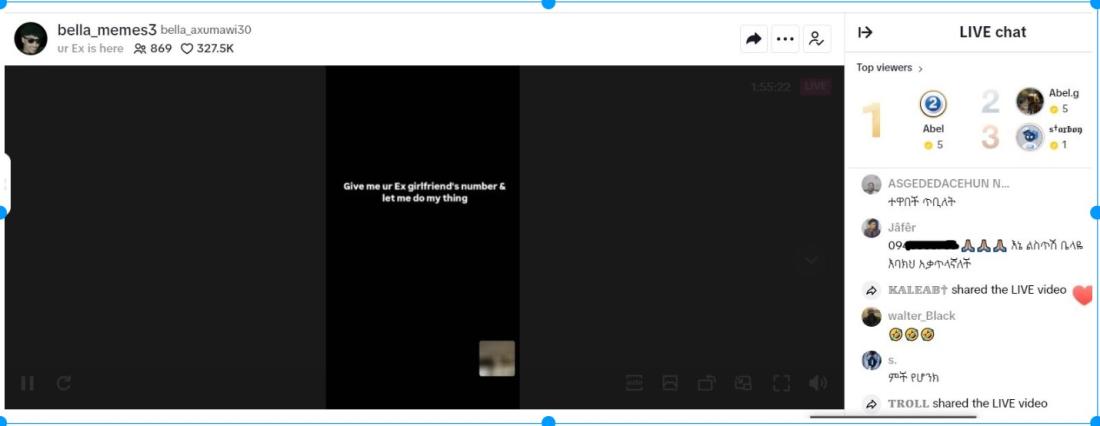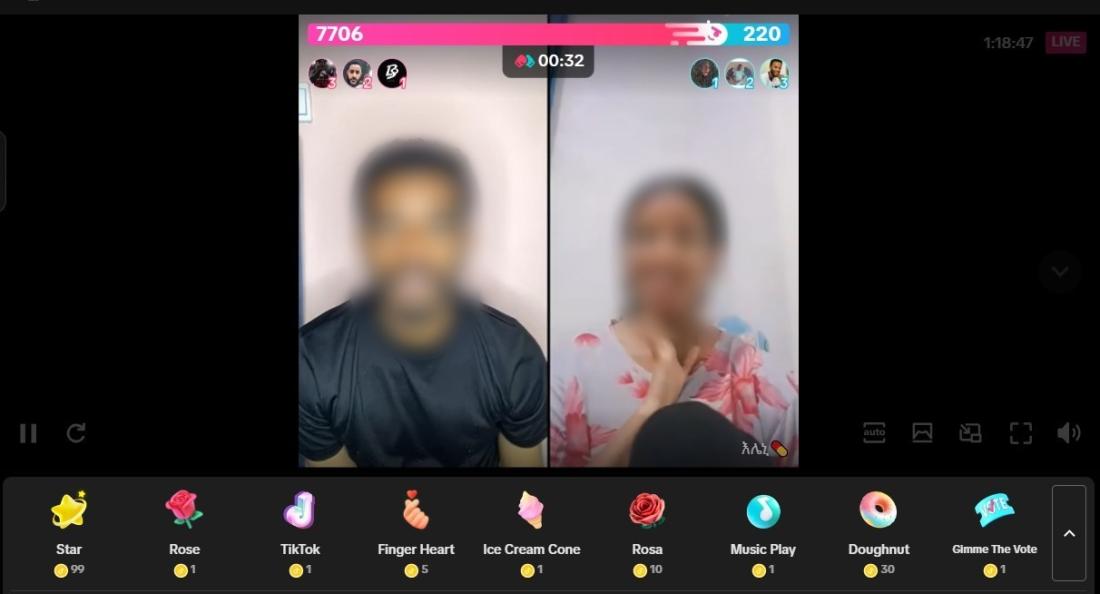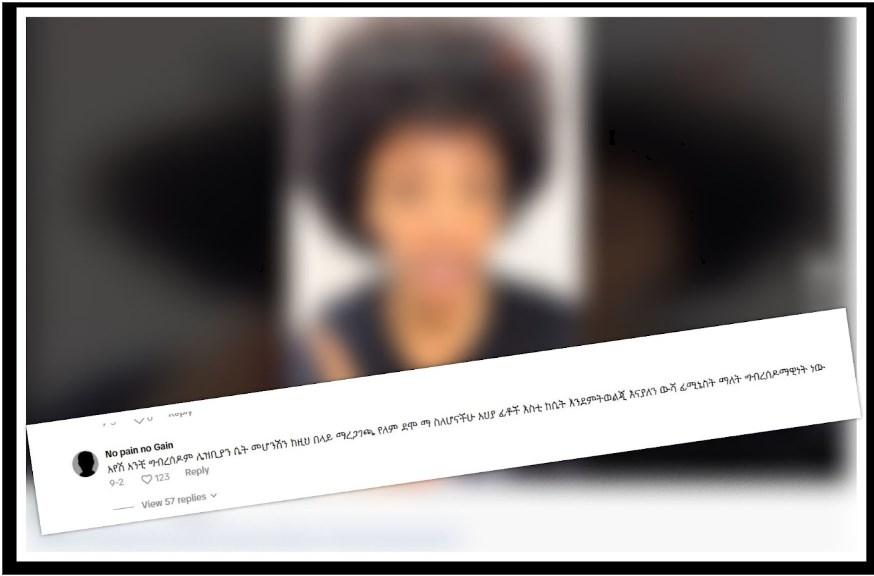
Ethiopian feminists become online targets in fight against sexist attacks
- This article is more than one year old.
- Published on November 4, 2024 at 13:02
- Updated on November 7, 2024 at 11:46
- 7 min read
- By Tolera FIKRU GEMTA, AFP Ethiopia
The rape and murder of seven-year-old Heaven Awot in Ethiopia’s northern Amhara region sparked public outrage in August 2024 (archived here). It also prompted prominent feminist Jordin Bezabih to launch a major internet campaign with the hashtag #JusticeforHeaven to fight against gender-based violence and trolls harassing girls and women across Ethiopia’s cyberspace (archived here). As a result, Jordin and other activists have themselves become targets of vicious attacks ranging from false claims linked to their sexuality to misogynistic insults and physical threats.
“The online offenders intend to silence us from speaking out about brutal gender-based sexual violence through public humiliation and shaming,” said Jordin, one of the co-founders of advocacy group Setaset Power (archived here). The organisation, whose Amharic name translates to “women in power”, uses social media platforms to promote women’s rights and battle gender-based violence.
Setaset Power members are frequently subjected to online slurs and intimidation in a country strongly dominated by patriarchal systems.
Jordin told AFP Fact Check she was recently forced to move homes after receiving a series of death threats.
“I have to wear a mask and glasses everywhere I go so I don’t get recognised,” the 33-year-old said.
“However, my colleagues and I choose to remain defiant despite the devastating effects of these attacks.”
Sexist live streams
In collaboration with Deutsche Welle Akademie, AFP Fact Check conducted an in-depth investigation into cyber harassment of women in Ethiopia over several weeks.
As part of the research, we analysed more than 300 posts published on TikTok and Facebook seeking to humiliate feminists and criticise their defence of LGBTQ+ issues. The insults ranged from disparaging remarks about their physical appearance to actual threats of physical violence.
“If I encounter this woman face to face, I promise I will shoot her in the head,” read one of many derogatory comments below a video posted on the TikTok account of one of the activists.
AFP Fact Check also monitored live chats aimed at shaming women on social media. The late-night sessions organised by male moderators often draw hundreds of participants, most of whom appear to be men.

Over 800 people logged into a live-streamed chat on TikTok in early September, in which they publicly shared the phone numbers of their ex-girlfriends and recounted sexual experiences with them.
In another video chat on TikTok, the host posted a picture with a photoshopped sign proclaiming that women should not deny men sexual intercourse during the fasting months.

A user responded by saying that “women were created to serve men with sex and therefore have no right to refuse sexual relations”.
AFP Fact Check observed that on occasion, a participant identifying themselves as a woman would be lured into these conversations and immediately be hit with an avalanche of lewd comments and requests for explicit photographs or sexual favours. The onslaught would prompt the person to exit the chat room again.
Ploys to attract young women frequently involve invitations to online games on TikTok, which merely serve as a front for men to harass female players.
“I am smart when I have sex so let's make an appointment and have sex. That way you can check my cleverness,” a male host told a young woman at the start of one of these sessions. She expressed discomfort but he continued to make misogynistic remarks.

“It seems that online challenge games have contributed significantly to the rise of online gender-based violence in Ethiopia,” said Kalkidan Tesfaye, the advocacy and communications manager at the Ethiopian Human Rights Defenders Center (EHRDW).
Gender equality is despised in a patriarchal “sex-oriented society” that is underpinned by religion, she added.
“Young women are increasingly exposed to extremely harmful online sexual abuse,” Kalkidan noted. “At EHRDW, we have encountered young women whose photos were seized by anonymous offenders who seek sexual relations or financial gain.”
Journalists, feminists targeted
Online attacks singling out feminist activists and journalists often involve references to their sexuality and label them “lesbians” – considered a slur in Ethiopia where same-sex relations are banned and carry harsh prison sentences.
"You follow homosexualism. Your face resembles that of a donkey. You are not a real woman... Your feminism is all about lesbians,” commented an anonymous user under a TikTok video on gender equality posted by Setaset Power’s Jordin.

Another co-founder of the organisation, Betelehem Akalework, told AFP Fact Check that online haters regularly accuse her of promoting homosexuality.
"I have received threats of acid attacks and death threats because of the labelling,” said the 32-year-old mother of two.
“I was also physically assaulted and humiliated by three men a year ago when I was pregnant.”
A scan of Betelehem’s feed on TikTok revealed a death threat in the comment section below one of her videos.
"If I found you in person I would not only attack you with acid but I would burn you alive," the user wrote.
Like Jordin, Betelehem had to move homes for fear of reprisal. She was the target of revenge porn and briefly quit social media advocacy due to the relentless abuse.
“I am forced to homeschool my elder son who is four and a half years old. I can't even leave my child in someone else’s hands because I kept receiving threats that they would rape my children,” said Betelehem, breaking down in tears.
A journalist who asked to remain anonymous for safety reasons said she had also been subjected to “multiple death threats” via online messages.
“Some of them accused me of advancing political views they did not support; others say they hate me in general,” the reporter added.
Digital rights legal void
Ethiopian authorities have failed to help so far, according to victims of online abuse.
“The police keep telling us to leave the digital space completely… The law does not protect citizens from online violence,” Betelehem said.
Experts confirmed that Ethiopia does not have a specific legal framework to help address the issue.
“Unlike other countries, there is no specific law on gender-based online violence in Ethiopia, which greatly affects women,” said human rights lecturer Marga Fekadu of Ethiopia’s Wolkite University.
As a result, “when it comes to human rights issues such as online gender-based violence, law enforcement bodies are reluctant to respond due to the absence of clear and specific laws to ensure justice.”
Megdelawit Getahun, a digital and women’s rights expert at the Centre for Advancement of Rights and Democracy (CARD), warned that the absence of laws had “led to a lack of accountability regarding the increasing technology-facilitated gender-based violence perpetrated on Ethiopian social media platforms”.
Laws needed
In their quest to fight back, victims say they take screenshots and recordings of the threats to track down the identity of the perpetrators and expose them online. They also report offensive messages to social media companies, demanding the offenders be banned. But the response is often disappointing, according to Jordin.
“Social platforms sometimes react by removing violent content. However, the online offenders were never banned. I could only block them,” she said.
TikTok told AFP Fact Check that it uses a combination of “advanced technologies and rigorous moderation strategies” to detect content in breach of its safety policies, with consequences that include removing posts and banning accounts.
“We have removed several of the videos that you shared with us for violating our community guidelines, which prohibit hateful behaviour, hate speech, and the promotion of hateful ideologies. This includes content that attacks any user, whether explicitly or implicitly,” the platform said in a statement.
The company added it had tens of thousands of “trust and safety professionals” working to safeguard users and consulted with human rights experts.
“Our Sub-Saharan (SSA) Safety Advisory Council brings together experts from across the region with a diverse range of backgrounds to work closely with us on developing policies and processes that tackle today’s safety concerns. Several of the experts on our SSA Safety Advisory Council are experts in countering hate speech and gender-based violence," it said.
Yet, many of those targeted online in Ethiopia end up shunning public events and deleting their social media accounts.
Advocates are calling on the government to create appropriate laws, on social media companies to better monitor and regulate content in Ethiopia’s multiple languages, and for a free hotline for trolling victims.
“Considering the prevalence of traditional harmful practices and gender inequality that also manifest in online life in Ethiopia, a specific law on online gender-based violence is a must,” said human rights lecturer Marga.
Corrected: spelling of Betelehem Akalework; update to Kalkidan Tesfaye's job title and name of organisationNovember 7, 2024 Corrected: spelling of Betelehem Akalework; update to Kalkidan Tesfaye's job title and name of organisation
Copyright © AFP 2017-2026. Any commercial use of this content requires a subscription. Click here to find out more.
Is there content that you would like AFP to fact-check? Get in touch.
Contact us
